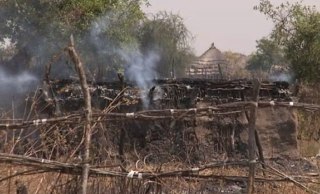South Sudan accuses Khartoum of arming Jonglei tribes
January 3, 2012 (JUBA) – South Sudan accused north Sudan on Tuesday of supplying arms to tribes in volatile Jonglei state, allegedly to destabilise the Africa’s newest nation.

Cattle raiding between the two groups have escalated into ethnic violence, with 6,000 armed Luo-Nuer entering Murle territory, burning house, stealing cattle and killing around 150 people.
“There is no doubt that there have been casualties,” Lise Grande, UN Deputy Humanitarian Coordinator for South Sudan, told the press on Tuesday.
“I would put the number in the tens, perhaps the hundreds, but we don’t know,” she added, pointing out it was too early to confirm the overall number of deaths in and around Pibor.
Over 1,000 have been killed since June 2010 in the conflict.
South Sudan’s army (SPLA) had initially struggled to protect civilians but said it had managed to force the Luo-Nuer to begin to retreat and leave Pibor after reinforcements were sent the area. The military, with help of UN troops, did manage to keep control of the centre of Pibor town and repulsed an attack on an army barracks on Monday.
Colonel Phillip Aguer, spokesman of the country’s army told journalists at weekly press briefing on Tuesday that north Sudan had supplied many of the weapons used the fighting.
“All the fire arms and other type of guns you see at the hands of both Murle and Lou Nuer in Jonglei, were deliberately supplied by the Sudanese government in Khartoum to these tribes through late renegade George Athor to destabilise security of this country”.
Athor was killed in fighting with the SPLA in December 2011.
South Sudan’s minister of information, Barnaba Marial Benjamin called on north Sudan to stop all support to rebels fighting the Juba based government including sending arms and ammunitions. Marial also called on all rebels, especially remnants of Athor’s group to lay down their arms and accept the amnesty offered by South Sudan’s president.
On Tuesday the UN Secretary-General, Ban Ki-moon, with the Kiir, and expressed appreciation for his commitment to protect civilians. Thousands of extra police and troops have been sent to the region, while dialogue is continuing.
Ban told Kiir that the root causes of the cnflict needed to be addressed, adding that commitment to the rule of law and respect for human rights was fundamental.
Kiiir was told that the UN Mission in South Sudan (UNMISS) was fully mobilised to assist the Government in its efforts to ease tensions.
UNMISS humanitarian coordinator, Lise Grande, on Tuesday told journalists that thousands of local inhabitants; mostly innocent civilians had fled the conflict before the town was attacked.
“We are worried about their conditions. They are without water, shelter and food. They are hiding in the bush. I think it is between 20,000 and 50,000. This is an estimate only,” she said.
“The situation on the ground now in humanitarian terms is grim, ” she said. “Because people fled town, they didn’t take anything with them, they’ve been in the bush many of them for up to a week. They haven’t had food, they haven’t had access to clean water, in a number of cases some of their people are wounded, they haven’t had shelter.”
The country’s army spokesman Phillip Aguer said government forces were already controlling general security situation in Pibor although the youth had attempted to fight the army.
“There has been reinforcement. Pibor town is now under full control of the SPLA”, Aguer said, referring to the national army.
(ST)
